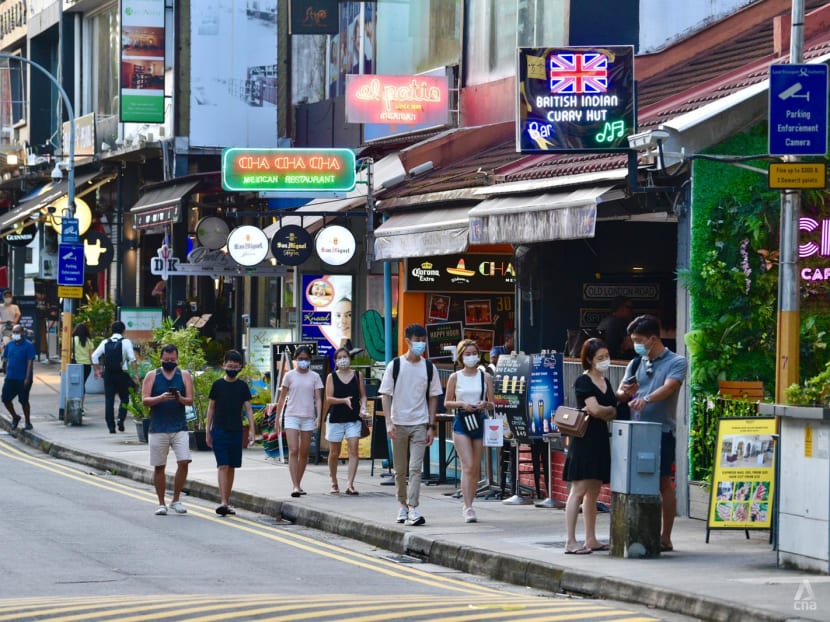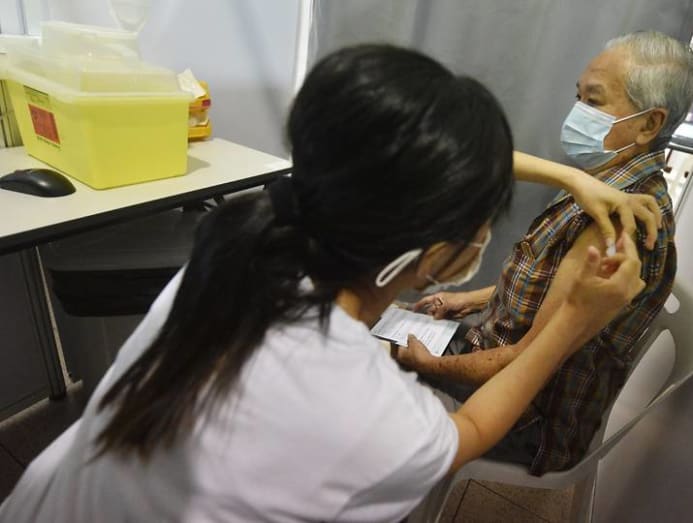Commentary: Can we live with COVID-19 and stop worrying?
The trick is in deciding what we choose to focus on and that can change how we feel, says SUSS sociologist Omer Ali Saifudeen.

People walking in pairs in Holland Village on Aug 10, 2021, as dining-in at food and beverage outlets resumes for those who have been fully vaccinated against COVID-19. (Photo: Jeremy Long)
SINGAPORE: Like so many, I have taken to cycling and it gives me great joy as I explore little-known pockets of green.
About a month ago, I experienced something scary. My legs cramped up badly during the last part of my ride and the pain shot up every time I moved.
I didn’t think I could make it home. But I decided to stop fighting the pain and the overwhelming fear that was taking hold of me.
Some rest, a few deep breaths and a quick pep talk later, I climbed back on my bike. And as the pain somehow eased, I slowly pedalled the last few metres home, feeling elated and my earlier fears a distant memory.
That incident made me think about the fears we focus on and how we reinforce them.
The late Dr Wayne Dyer who spoke widely on motivation and self-improvement once said: “What you think about, expands. If your thoughts are centered on what's missing, then what is missing, by definition, will have to expand.”
Since mid-September, Singapore has been going through another challenging phase in our fight against COVID-19. As we see daily infections and deaths climb, our feelings of fear and anxiety rise too. Already feeling fatigued and missing the things we used to enjoy, like travel, this sense of weariness is palpable.
Co-chair of the multi-ministry task force Lawrence Wong addressed this on Saturday (Oct 2) during a media briefing. He said this current wave can look worrying but that we cannot “get too carried away” or be “too anxious or fearful” about daily COVID-19 case numbers.
For many of us, the high daily numbers only confirm our fears about how the pandemic will hurt us and the more we think about it the worse we feel.
In social psychology, this is called “social salience”. This refers to how much a particular object or event attracts attention and it usually stems from how much it stands out from the things we are used to.
Social salience can be a survival mechanism: It makes us aware of potential threats. It focuses our attention on what has changed in the environment and triggers certain defence mechanisms.
RISE OF FEAR AND ANXIETY
However, this same survival mechanism can also lead to biased perceptions. We call this the “salience bias”.
It happens when we make decisions based on what is most noticeable or important to us. Unfortunately, we may end up overlooking other important information in the process.
In our COVID-19 world, because of the information we get about daily infections and deaths, it is natural for people to focus on just those things.
Imagine for instance, if data on how many people die in road accidents were published every day. People may begin to fear driving and may avoid it.
But it is also fact that the vast majority – 98 per cent - of infected cases are mild or asymptomatic. Children under 12 accounted for just 0.6 per cent of all local infections and none required critical care. Doctors have also reiterated that vaccination and infection provide valuable immunity against variants.
Yes, COVID-19 can be devastating for those who are vulnerable, and the science is still unclear about the long-term effects of an infection. These are things we do our best with but cannot control.
For the rest of us, so long as we are socially responsible, we still have the opportunity to go about our daily lives without feeling constantly trapped by fear.
A CHANCE TO TRANSITION TO RESILIENCE
All major societal upheavals go through a transition phase. Auguste Comte, one of the founders of sociology as a discipline and sociologist Herbert Spencer, described how social change can be viewed using an evolutionary model similar to how we have seen organisms evolve over time.
Hence societies evolve towards a more advanced and better state.
Interestingly societies which cannot adapt fast enough to external changes will decline. According to this evolutionary model, all societies go through this and arrive at different trajectories.

Singapore is no different. It is going through a period of evolutionary transition, towards endemic COVID-19 living. As we have seen, this process can be rocky as all transitions are bound to be.
But the transition offers a chance for us to be stronger, more resilient, and perhaps even imbued with newfound abilities and capacities.
This, however, requires a shift in the way we think about dangers and risks, and not be preoccupied by them. Responsibility for inculcating a resilient societal mindset does not only rest with the Government but every resident.
How do we go about a new way of thinking about COVID-19?
The first step is to move away from the fixation with infection numbers, prioritise medical attention for the most vulnerable and continue safe management protocols and vaccination.
Second, normalise the practice of those with no or mild symptoms recovering at home. Without this shift, we may continue to see those with mild symptoms panicking, heading to hospitals and taxing vital medical resources that could have been directed to those who need it more urgently.
Third is to focus on what we can do to help fellow Singaporeans who might not be coping as well, and on meaningful things we can be grateful for and take comfort in.
Finally, we can think about what will be better when this COVID-19 storm passes. For instance, migrant worker dormitories of tomorrow will be safer with even better sanitary conditions.
What does the data say about COVID-19 booster shots and why the mixed scientific views? Experts weigh in:
OUR COLLECTIVE EMPATHY
The seismic shift wrought by COVID-19 has similar beneficial effects on other areas of our lives – like our ability to work from home or discover the joys of our green spaces.
Businesses too are pivoting with new innovations. As a society, we have also become aware of the most hard hit among us and can now empathise and find better ways of helping them cope. In short, we have the potential to evolve as a society, and the process has already begun.
As Viktor Emil Frankl, Austrian neurologist, psychiatrist, philosopher, author and Holocaust survivor once said, “Our greatest freedom is the freedom to choose our attitude.”
Victor Frankl also talked about “dereflection” which involves pivoting one’s focus away from oneself and towards others.
This, according to Frankl, makes one complete and prevents “hyper-reflection” on anxiety-generating situations. It all comes down to where we decide to put our focus and what we chase.
If done collectively as a society, the impact can be profound. COVID-19 then becomes just another part of reality to adapt and navigate through.
Dr Omer Ali Saifudeen is a sociologist and Senior Lecturer, Public Safety and Security Programme, at the School of Humanities and Behavioural Sciences, Singapore University of Social Sciences.







